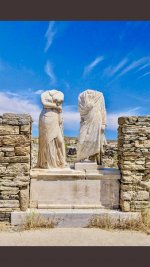Hash
Well-known member
The statues of Cleopatra and her husband Dioscurides were placed by the entrance of their house to greet the guests. Delos island, Cyclades, Greece. https://t.co/t2gzPx0K9y

Follow along with the video below to see how to install our site as a web app on your home screen.
Note: This feature may not be available in some browsers.

Me neither! I love Kleopatra!!I have been intrigued by Delos for some time - seems like there are a lot of great artifacts there. I didn't realize Cleopatra and her husband were depicted here!
When I was working promoting Delos Excursions we asked my Tour Guides to recreate a model village of what Delos would have looked like it's original days....A Majestic and powerful force to reckon with....All the Tour Guides received standing ovations and .... lots of tips.... rightfully deserved....The poor Tour Guides working every day in unbearable heat and sometimes 5/6 Guided Tours per day... Respect and Salute for themMe neither! I love Kleopatra!!
It would have been amazing seeing a tour like that!!! I was looking at some photos and Delos looks so interesting.When I was working promoting Delos Excursions we asked my Tour Guides to recreate a model village of what Delos would have looked like it's original days....A Majestic and powerful force to reckon with....All the Tour Guides received standing ovations and .... lots of tips.... rightfully deserved....The poor Tour Guides working every day in unbearable heat and sometimes 5/6 Guided Tours per day... Respect and Salute for them...I remember them all well.My sentimental and meaningful contribution to the Greek Tourism Industry.
It is!!......The museum is now reburised and modernised, if you have an opportunity to visit,do it in April/Early May..... you will see the island full of red Poppies,Chrysanthemum and other pretty colorful flowers.... Kalley Mera from Thailand.It would have been amazing seeing a tour like that!!! I was looking at some photos and Delos looks so interesting.
Stunning! I've never seen red poppies in GreeceIt is!!......The museum is now reburised and modernised, if you have an opportunity to visit,do it in April/Early May..... you will see the island full of red Poppies,Chrysanthemum and other pretty colorful flowers.... Kalley Mera from Thailand.

